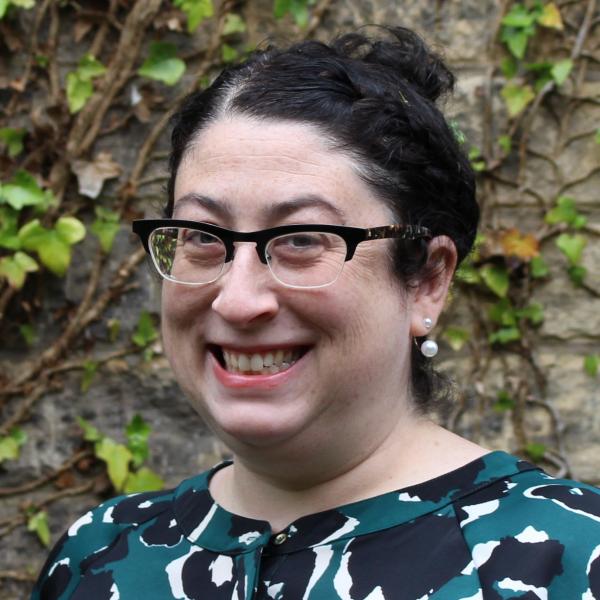Dr Lisa Stampnitzky (she/her)
School of Sociological Studies, Politics and International Relations
Lecturer in Politics


+44 114 222 1701
Full contact details
School of Sociological Studies, Politics and International Relations
Elmfield Building
Northumberland Road
Sheffield
S10 2TU
- Profile
-
Dr Stampnitzky joined the department as Lecturer in Politics in 2015. Her principal research interests lie at the intersection of knowledge, violence, and power, with a particular focus on the production of popular and expert knowledge about war, terrorism, and human rights. She currently serves as the department’s director for postgraduate research.
- Qualifications
-
I earned my BA in sociology at New College of Florida, and an MA and PhD in Sociology at the University of California, Berkeley. I subsequently held research fellowships at Stanford, Oxford, Harvard, Ohio State, and the European University Institute, and was Lecturer on Social Studies at Harvard University from 2012-2015.
- Research interests
-
My research analyses how understandings of state and non-state violence are politically, socially, and historically constructed, drawing together theories and methods from politics and international relations, sociology, and science and technology studies. I also have interests in the role of ‘expertise’ in society, the politics of secrecy/denial/ignorance, the sociology of knowledge, and historical sociology.
My current book project, How Torture Became Speakable, aims to explain the puzzle of why the post-9/11 war on terror has been characterized by the open justification of practices that violate human rights norms, such as torture and assassination. While the literature on human rights predicts that states will sometimes fail to abide by the norms they rhetorically affirm, it is expected that this will manifest as hypocrisy, rather than open defiance of such norms. The puzzle, then, is why the US has chosen to openly justify the practices of "harsh interrogation" and "targeted killing," rather than rely on a strategy of denial.
My first book*, Disciplining Terror: How Experts Invented “Terrorism” (Cambridge University Press, 2013), addressed the question of how the contemporary concept of "terrorism" took shape. Through a multi-method study, drawing on historical research, network analysis, and interviews with experts in the field, it establishes how both "terrorism" and terrorism expertise were socially and historically constructed. *Disciplining Terror has been awarded the 2015 Francesco Guicciardini Prize for Best Book in Historical International Relations from the International Studies Association; the 2015 International Political Sociology Book Award from the International Studies Association; and the 2012 President's Book Award from the Social Science History Association.
- Publications
-
Books
Journal articles
- Where is Palestine in Critical Terrorism Studies? A roundtable conversation. Critical Studies on Terrorism, 17(3), 437-462.


- Rethinking the “crisis of expertise”: a relational approach. Theory and Society.


- Truth and consequences? Reconceptualizing the politics of exposure. Security Dialogue, 51(6), 597-613. View this article in WRRO


- The lawyers' war: states and human rights in a transnational field. The Sociological Review, 64(2_suppl), 170-193.


- The lawyers' war: states and human rights in a transnational field. Sociological Review, 64(2), 170-193. View this article in WRRO


- Toward a Sociology of “Security”. Sociological Forum, 28(3), 631-633.


- Experts, États et théorie des champs. Sociologie de l'expertise en matière de terrorisme. Critique internationale, N° 59(2), 89-104.


- Disciplining an Unruly Field: Terrorism Experts and Theories of Scientific/Intellectual Production. Qualitative Sociology, 34(1), 1-19.


- How Does “Culture” Become “Capital”? Cultural and Institutional Struggles over “Character and Personality” at Harvard. Sociological Perspectives, 49(4), 461-481.


Book chapters
- Accessing the “field” of terrorism studies, Research Methods in Critical Security Studies (pp. 50-58). Routledge


- Making Sense of Terrorism, Making Sense of Radicalization and Violent Extremism (pp. 142-149). Routledge


- 1. Can Terrorism Be Defined?, Constructions of Terrorism (pp. 11-20). University of California Press


- Can terrorism be defined?, Constructions of Terrorism an Interdisciplinary Approach to Research and Policy (pp. 11-20).


- The emergence of terrorism studies as a field, Routledge Handbook of Critical Terrorism Studies (pp. 17-27).


- Sociology: Security and insecurities, Security (pp. 90-110). Cambridge University Press


- Problematic knowledge: How 'terrorism' resists expertise, Security Expertise Practice Power Responsibility (pp. 158-171).


Book reviews
- Normative Transformation and the War on Terrorism: The Evolution of Targeted Killing, Torture, and Private Military Contracting. By Simon Frankel Pratt. Cambridge: Cambridge University Press, 2022. 215p. $110.00 cloth.. Perspectives on Politics, 21(1), 399-400.


- Legalizing war/militarizing law. Dialogues in Human Geography.


- Tortured Logic: Why Some Americans Support the Use of Torture in Counterterrorism. Contemporary Sociology: A Journal of Reviews, 51(1), 53-55.


- Liberal democracies and the torture of their citizens. International Affairs, 94(6), 1455-1456.


- Film Review: Torture: Made in the USA. Teaching Sociology, 44(1), 66-68.


- Film Review: Drones in My Backyard. Teaching Sociology, 44(1), 68-68.


- Where is Palestine in Critical Terrorism Studies? A roundtable conversation. Critical Studies on Terrorism, 17(3), 437-462.
- Research group
-
International Relations
- Grants
-
My work has been funded by a Leverhulme Research Grant.
- Teaching interests
-
I have also taught in the areas of terrorism and political violence, human rights, and research methods.
- Teaching activities
-
I currently teach POL 3033, Legitimate and Illegitimate Violence.
- Professional activities and memberships
-
Dr Stampnitzky has provided commentary for a number of media outlets, including Sky News, BBC Radio 5 and Democracy Now!
- PhD Supervision
I am able to supervise PhD research in areas including the politics of knowledge/science/expertise, and social/cultural/discursive/historical approaches to the study of violence, human rights, and the war on terror.
